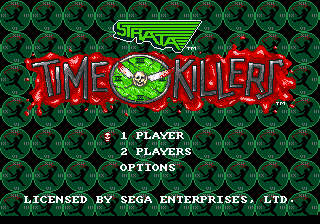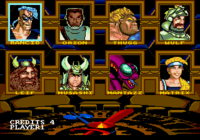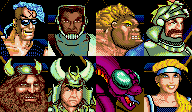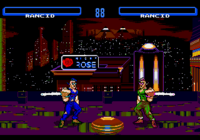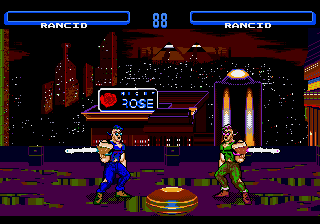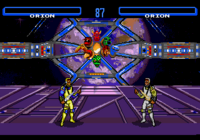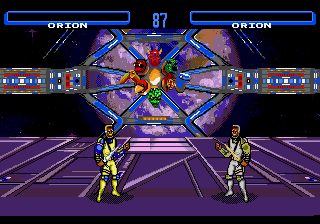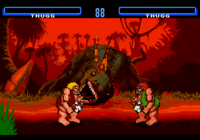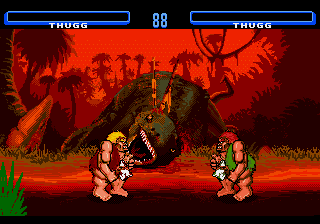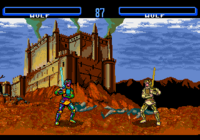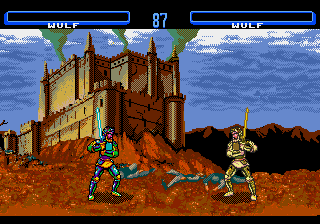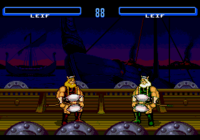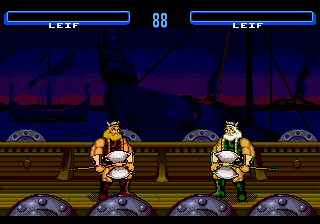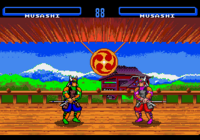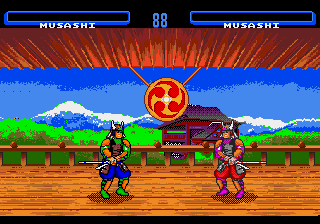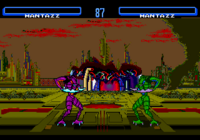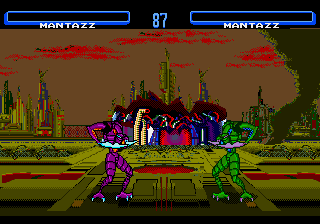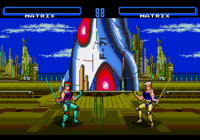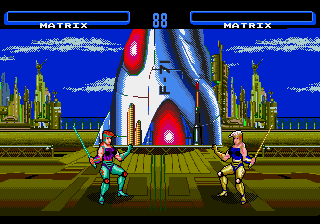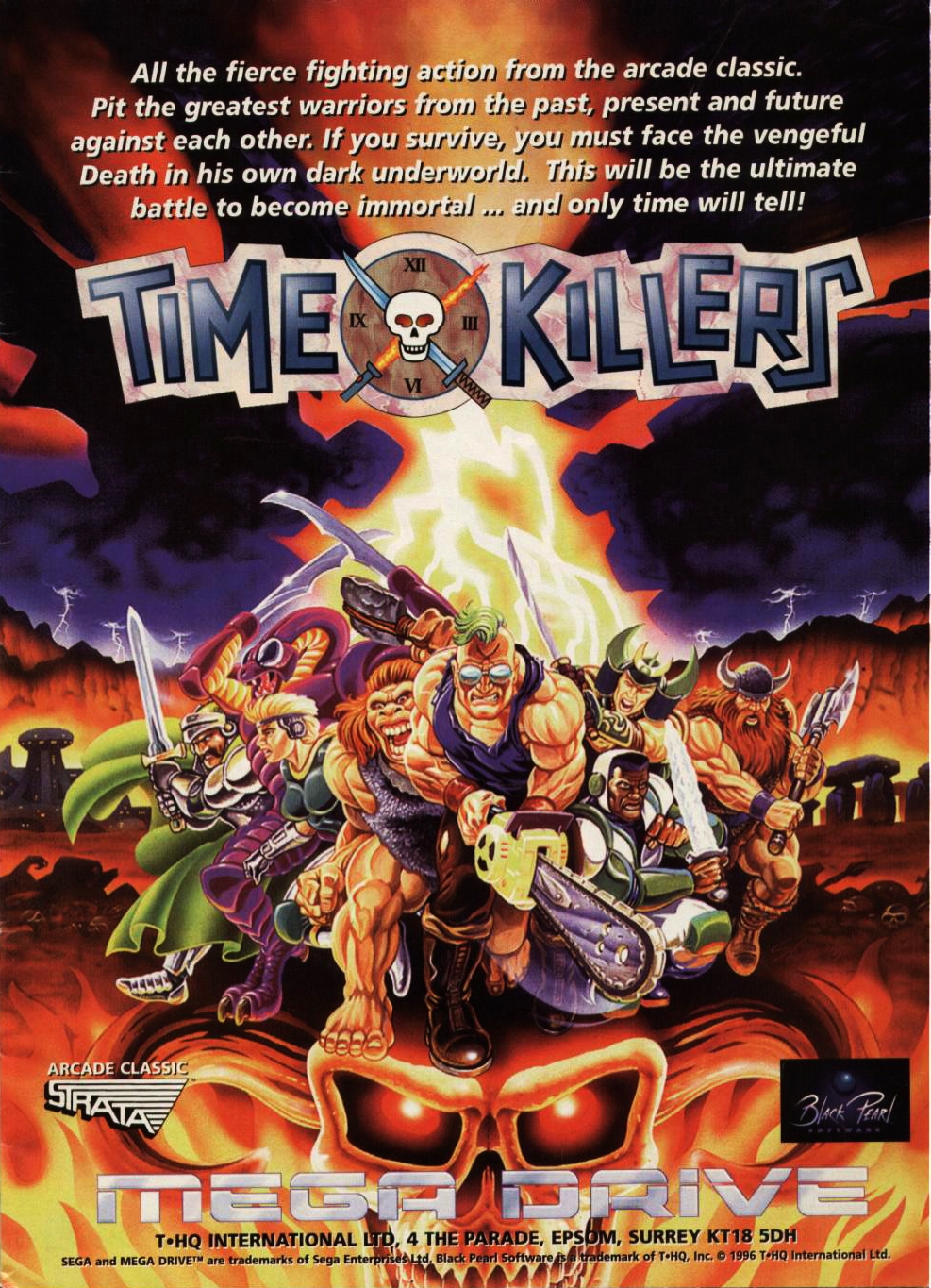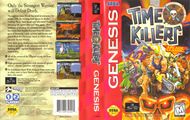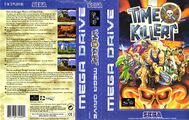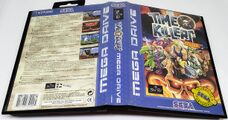Time Killers
From Sega Retro
| Time Killers | ||||||||||||||||||||||||||||||
|---|---|---|---|---|---|---|---|---|---|---|---|---|---|---|---|---|---|---|---|---|---|---|---|---|---|---|---|---|---|---|
| System(s): Sega Mega Drive | ||||||||||||||||||||||||||||||
| Publisher: Black Pearl Software | ||||||||||||||||||||||||||||||
| Developer: Black Pearl Software | ||||||||||||||||||||||||||||||
| Distributor: Ecofilmes (PT) | ||||||||||||||||||||||||||||||
| Licensor: Strata Games | ||||||||||||||||||||||||||||||
| Developer(s) of original games: Incredible Technologies | ||||||||||||||||||||||||||||||
| Peripherals supported: Six Button Control Pad | ||||||||||||||||||||||||||||||
| Genre: Action | ||||||||||||||||||||||||||||||
| Number of players: 1 | ||||||||||||||||||||||||||||||
| ||||||||||||||||||||||||||||||
|
Time Killers is an versus fighting game for the Sega Mega Drive, released in 1996. It is a port of an arcade game originally released in 1992.
THQ were working on a port as early as 1993[5], with a release originally planned for December[6] and later January 1994.[7] Though the game was reportedly complete by 1994,[8] it was not released until 1996, near the end of the console's lifespan, when it was published by THQ subsidiary Black Pearl Software.
A Sega Game Gear version was seemingly planned for release in Spring 1994[9], but was cancelled.
Contents
Story
Death has taken eight heroic warriors from different periods in human history and pitted them against each other for a chance at immortality.
Gameplay
Time Killers is a versus fighting game that takes inspiration from Street Fighter II and Mortal Kombat. It is an early example of a weapon-based fighting game, predating Samurai Shodown, and it is known for its exaggerated violence. Rather than the standard layout of punches and kicks of various strengths, a specific button is used to attack with the corresponding body part: back arm, weapon arm, back leg, weapon leg, and the head. A stronger attack can be executed by pressing both limb buttons at the same time.
If enough damage is done to an arm, it is severed from the character's body, rendering it useless in combat. Both arms can be severed in the same round, forcing the character to fight with only legs and head and depriving them of the ability to block or use weapons. Damage can also be done to the legs, but they cannot be severed. Players can attempt a "Death Move" that cuts off the opponent's head and ends the round immediately. However, these moves can be blocked and only decapitate if they hit near the opponent's head. "Super Death Moves" are also possible, which chop off both arms and the head, but they can only be executed while near a stunned opponent. Severed limbs and heads are restored after each round. A character can win a round by knocking out the opponent, executing either type of Death Move, or having more health than the opponent when time runs out. The color of the health bars changes depending on which player has the advantage (red for the player closest to defeat and green for the other). Two victories out of three are required to win a match.
Characters move with ![]() or
or ![]() and crouch with
and crouch with ![]() . They jump with
. They jump with ![]() ; holding it for longer jumps for longer, but pressing it slightly results in a short hop. Using a Six Button Control Pad, characters attack using the back arm with
; holding it for longer jumps for longer, but pressing it slightly results in a short hop. Using a Six Button Control Pad, characters attack using the back arm with ![]() , the weapon arm with
, the weapon arm with ![]() , both arms with
, both arms with ![]() +
+![]() , the back leg with
, the back leg with ![]() , the weapon leg with
, the weapon leg with ![]() , both legs with
, both legs with ![]() +
+![]() , and the head with
, and the head with ![]() . They can defend by holding
. They can defend by holding ![]() or by holding the D-Pad away from the opponent. The dedicated block button can be used to counter cross-up attacks. They can taunt by holding the D-Pad away from the opponent and pressing
or by holding the D-Pad away from the opponent. The dedicated block button can be used to counter cross-up attacks. They can taunt by holding the D-Pad away from the opponent and pressing ![]() , which recovers a portion of health. Death Moves are performed by pressing
, which recovers a portion of health. Death Moves are performed by pressing ![]() +
+![]() +
+![]() +
+![]() ; Super Death Moves are performed by pressing
; Super Death Moves are performed by pressing ![]() +
+![]() +
+![]() +
+![]() while holding the D-Pad towards a stunned opponent.
while holding the D-Pad towards a stunned opponent.
Using a standard control pad, characters attack using the back arm with ![]() +
+![]() , both arms with
, both arms with ![]() , the back leg with
, the back leg with ![]() , both legs with
, both legs with ![]() +
+![]() , and the head with
, and the head with ![]() . Notably, characters cannot attack with their weapon limbs alone when using a three-button control pad, limiting the number of moves available to them. They can defend by holding the D-Pad away from the opponent. They can taunt by holding the D-Pad away from the opponent and pressing
. Notably, characters cannot attack with their weapon limbs alone when using a three-button control pad, limiting the number of moves available to them. They can defend by holding the D-Pad away from the opponent. They can taunt by holding the D-Pad away from the opponent and pressing ![]() , which recovers a portion of health. Death moves are performed by pressing
, which recovers a portion of health. Death moves are performed by pressing ![]() +
+![]() +
+![]() ; Super Death Moves are performed by pressing
; Super Death Moves are performed by pressing ![]() +
+![]() +
+![]() while holding the D-Pad towards a stunned opponent.
while holding the D-Pad towards a stunned opponent.
The back limb attacks are quick but do light damage, essentially corresponding to the light attacks of other fighting games. Similarly, the both limb attacks are heavy but slow, while the weapon limb attacks are in between. Characters perform different attacks depending on whether they are close to or far from the opponent and whether they are standing, crouching, or jumping. Standing normal attacks also have variants that are performed by holding the D-Pad towards the opponent while attacking. Standing and crouching normal moves can be "flailed" by pressing the attack button rapidly, which repeats the move in place without the recovery animation. Characters have a brief moment of invulnerability after being attacked, making combos impossible. Most characters have special moves performed by combining a directional motion with an attack button.
Defending can be done by holding the D-Pad away from the opponent, which can be done while standing, crouching, or jumping. There are no low or high attacks, as in other fighting games, so any attack can be blocked while standing or crouching. Blocked attacks still inflict a small amount of damage. Blocking cancels the animation of being hit or knocked down, so it can also be used to recover faster from an attack. Characters are stunned for a duration if attacked repeatedly, and they can lose an arm if they suffer enough damage from weapon attacks. Losing the first arm deprives the character from being able to use the back arm and both arm attacks, while losing the second arm removes the weapon arm attacks and the ability to block.
Modes
There is a single-player mode where the player fights all eight warriors, then fights a final match against Death. The player may select any of the eight characters before each match, instead of having to play as the same character throughout the game. The game ends if the player loses a match and can only be continued a limited number of times (depending on the difficulty level). There is also a two-player mode where two players can choose any character and fight a single match against each other.
There are four difficulty levels (Cakeboy, Warrior, Hero, and Timekiller) and three game speeds (Arcade, Champion, and Turbo). There is also a setting for the amount of violence (No Blood, Blood, Dismember, Decapitate), which affects the gameplay since it can limit the ability to dismember fighters.
Characters
Note: Move lists assume that the character is facing right. When facing left, ![]() and
and ![]() should be reversed.
should be reversed.
| P | Any arm attack |
| LP | Back arm |
| MP | Weapon arm |
| HP | Both arms |
| K | Any leg attack |
| LK | Back leg |
| MK | Weapon leg |
| HK | Both legs |
| H | Head |
Playable
Bosses
| Death | ||||||||||||||||||
|---|---|---|---|---|---|---|---|---|---|---|---|---|---|---|---|---|---|---|
The personification of death, who has orchestrated the tournament, pitting time's greatest warriors against each other. He is the final boss of the game and grants immortality to the warrior that defeats him. He can only be defeated in the final round using a Death Move; otherwise, he regenerates all of his health instead. He can be played in the single-player mode using a cheat code.
|
Stages
Every character has his or her own stage where matches take place in the single-player mode. The final fight with Death takes place in a random stage. In two-player games, the match takes place in the first player's stage.
Magazine articles
- Main article: Time Killers/Magazine articles.
Promotional material
also published in:
- (US) #41: "September 1996" (1996-0x-xx)[10]
Physical scans
| Sega Retro Average | |||||||||||||||||||||||||||||||||||||||||||||||||||||||||||
|---|---|---|---|---|---|---|---|---|---|---|---|---|---|---|---|---|---|---|---|---|---|---|---|---|---|---|---|---|---|---|---|---|---|---|---|---|---|---|---|---|---|---|---|---|---|---|---|---|---|---|---|---|---|---|---|---|---|---|---|
|
| 31 | |
|---|---|
| Based on 11 reviews | |
Technical information
- Main article: Time Killers/Technical information.
References
- ↑ GamePro, "May 1996" (US; 1996-xx-xx), page 48
- ↑ https://groups.google.com/g/rec.games.video.sega/c/mmYWeDrlb2M/m/R0IbUO8zRpUJ
- ↑ 3.0 3.1 Game Players, "Vol. 9 No. 7 July 1996" (US; 1996-06-11), page 72
- ↑ 4.0 4.1 GamesMaster, "October 1996" (UK; 1996-08-29), page 11
- ↑ GamePro, "December 1993" (US; 1993-xx-xx), page 93
- ↑ 6.0 6.1 Mega Play, "December 1993" (US; 1993-1x-xx), page 76
- ↑ VideoGames, "February 1994" (US; 1994-0x-xx), page 40
- ↑ GamePro, "July 1994" (US; 1994-xx-xx), page 174
- ↑ Game Informer, "March/April 1994" (US; 1994-0x-xx), page 49
- ↑ Game Informer, "September 1996" (US; 1996-0x-xx), page 23
- ↑ 1700 igr dlya Sega, "" (RU; 2001-xx-xx), page 244
- ↑ Electronic Gaming Monthly, "December 1993" (US; 1993-xx-xx), page 51
- ↑ Electronic Gaming Monthly, "January 1994" (US; 199x-xx-xx), page 46
- ↑ GameFan, "Volume 4, Issue 7: July 1996" (US; 1996-xx-xx), page 12
- ↑ GamePro, "July 1996" (US; 1996-xx-xx), page 78
- ↑ Game Informer, "June 1996" (US; 1996-0x-xx), page 61
- ↑ Game Informer, "August 2001" (US; 2001-0x-xx), page 130
- ↑ Next Generation, "August 1996" (US; 1996-07-23), page 105
- ↑ Tricks 16 bit, "Tricks Sega Gold 800 igr" (RU; 1998-03-20), page 201
| Time Killers | |
|---|---|
|
Main page | Comparisons | Hidden content | Magazine articles | Reception | Region coding | Technical information | Bootlegs | |
- Six Button Control Pad-compatible games
- 1 player games
- US Mega Drive games
- All US games
- US Sega Channel games
- EU Mega Drive games
- All EU games
- PT Mega Drive games
- All PT games
- UK Mega Drive games
- All UK games
- Mega Drive games
- 1996 Mega Drive games
- All 1996 games
- Mega Drive action games
- All action games
- All games
- Time Killers
- Unreleased Game Gear games
